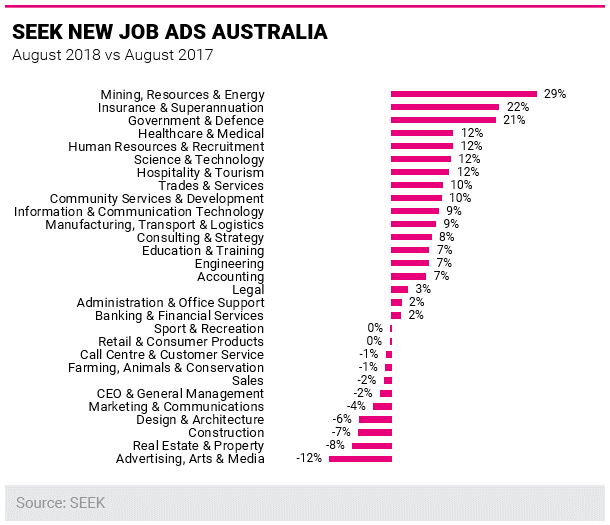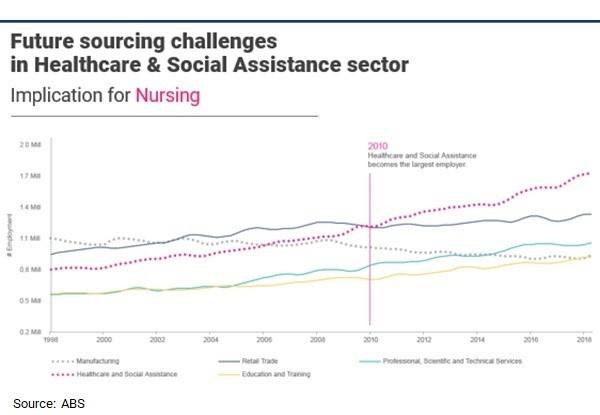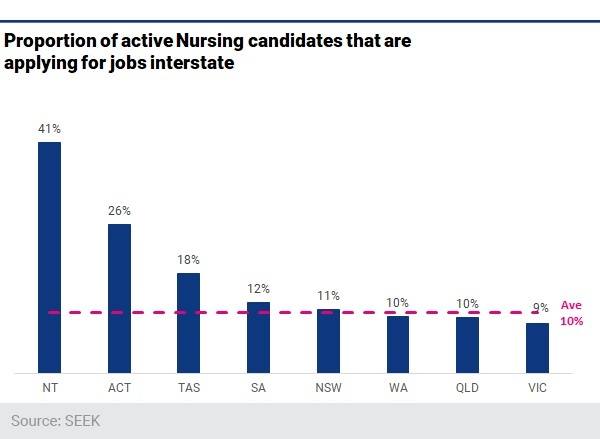Australia’s nomadic nurses favouring smaller states
-
SEEK job ads up 5.4 per cent in August compared to this time last year
-
Nurses favouring smaller states for job opportunities
New job ads nationally have grown 5.4 per cent in August compared to this time last year, according to the latest data from SEEK. This figure is the lowest YoY growth in national SEEK job ads since March 2017.
For the 13th consecutive month, Mining, Resources & Energy sector saw the greatest job ad growth across Australia growing 29 per cent in August 2018 compared to August 2017. Australia’s largest employing industries across the country demonstrated double digit growth in job ads for the year to August, including Healthcare & Medical (12 per cent), Hospitality & Tourism (12 per cent), Trades & Services (10 per cent) and Community Services & Development (10 per cent).
Kendra Banks, Managing Director ANZ, SEEK, said: “Despite growth slowing in recent months, national job ads remain 5.4 per cent higher than the previous year. So, although it is the weakest growth we’ve seen since March last year, it is indicative of a solid overall demand for labour. We are still seeing jobs growth well above the national average in some of our biggest employing sectors, pointing to a healthy and stable job market for Australia’s crucial industries.”
Fig 1: SEEK job ad YoY growth, August 2018 vs August 2017

Industry focus: Nursing
As reported by the ABS, the Healthcare & Medical and Social Assistance sector is Australia's largest employer, currently accounting for 13 per cent of the total Australian workforce[1]. The sector reached this milestone in 2010 when it surpassed the Retail sector and has continued to expand steadily ever since.
Fig 2: Healthcare & Medical sector overtakes Retail sector as largest employer

SEEK data reflects this growth with Healthcare & Medical job ads recording 12 per cent YoY growth in August 2018 compared to 2017. The top performing states for job ad growth in the sector this month were Tasmania (30 per cent), South Australia (24 per cent) and New South Wales, the sector’s biggest employer (21 per cent).
Nursing roles in good health
Nursing roles, which comprise 22 per cent of the Healthcare & Medical labour market, have been the biggest contributor to this sector’s growth in recent months.
The Aged Care sector is driving the growth in nursing roles, with particularly high growth in Tasmania, South Australia and Western Australia – states, which are recognised for having an aging population greater than the national average.
With the increased demand for healthcare services because of Australia's growing and aging population, the Department of Health suggests Australia is approaching a ‘nursing shortage’ crisis of about 85,000 nurses by 2025, growing to 123,000 nurses by 2030[2].
However, SEEK data shows national nursing candidate availability has experienced steady growth in the last 12 months, outstripping national demand. This points to a greater supply of candidates in the market vying for positions and meaning it is getting easier to find nursing staff this year across the country.
Concern regarding the shortage of nurses also appears to be in contrast with the current nursing education environment. Domestic student enrolment in nursing courses has been strong, with an average yearly increase of 6% between 2010 and 2016, according to the Australian Department of Education and Training. This figure has increased to become on par with students enrolling in traditionally high-demand courses, such as ICT.
Dr Cathy Dickson, Program Director of Nursing and Health Science at Western Sydney University Online, said: “We are experiencing high demand for our online nursing course, reflecting the increase in domestic enrolments nationally. Many of our students are juggling busy family lives with part-time work. By providing access to flexible, high-quality education online we are enabling more people to realise their ambition of joining the nursing profession and helping to address the nursing shortage.”
Nursing nomads
SEEK data reveals that nationally, one in ten of nurses currently looking for work are willing to relocate to another state for work. This trend is led by Northern Territory where 41 per cent of nurses currently looking for job opportunities are looking interstate. Further, all nursing candidates nationally overwhelmingly favour the smaller states when looking interstate for roles, with candidates in New South Wales and Victoria more likely to move to Australian Capital Territory, Tasmania and Northern Territory.
Fig 3: Proportion of nursing candidates applying for jobs outside of their home state
While the Healthcare powerhouses of Victoria and New South Wales hold the larger share of jobs in the sector, some of the smaller states are seeing impressive growth across a number of specialised nursing roles, contributing to this trend of nursing candidates moving interstate.
Due to this trend, the smaller states of Australian Capital Territory, Tasmania and Northern Territory are all recording higher net gains in nursing candidate applications than their larger counterparts. The larger states of New South Wales and Western Australia are suffering the largest net losses.
Kendra Banks, Managing Director ANZ, SEEK, said: “We know that workers in the Healthcare & Medical sector place high importance on opportunities for career development when looking for a new role. Our nurses are looking for new experiences, and opportunities for professional development and to use a wide variety of different skills. Smaller states give health care professionals the chance to work with specific populations, such as indigenous communities in Northern Territory or the ageing population in Tasmania.”
MEDIA NOTE: When reporting SEEK data, you must attribute SEEK as the source.
Download Employment Data Report
–END–
About SEEK (ASX:SEK):
SEEK’s purpose is to help people live more fulfilling and productive working lives and help organisations succeed. SEEK makes a positive contribution to people’s lives on a global scale.
SEEK is the global leader in the creation and operation of online employment markets.
Globally SEEK has relationships with over 800,000 hirers and 180 million candidates.
SEEK makes a positive contribution to people’s lives through connecting more people to relevant job opportunities using its marketplace scale and technology to build radically more efficient and effective employment marketplaces.
SEEK is listed on the Australian Securities Exchange, and has been listed in the Top 20 Most Innovative Companies Globally by Forbes, and Number One in Australia.
SEEK has been recognised by AON Hewitt as an Employer of Choice for eleven years and is passionate about it’s company's culture. SEEK is a leader in workplace diversity and inclusion.
For 20 years SEEK has been an integral part of Australians’ job-search process, and as the country’s leading employment marketplace is uniquely positioned to empower Australians with career, education and volunteer opportunities to create productive and fulfilling working lives.
About the SEEK Employment Report
The SEEK Employment Report provides a comprehensive overview of the Australian Employment Marketplace. The report includes the SEEK Employment Index (SEI), which is the first Australia aggregate indicator to measure the interaction between labour market supply and labour market demand.
It also includes the SEEK New Job Ad Index which measures only new job ads posted within the reported month to provide a clean measure of demand for labour across all classifications.
SEEK’s total job ad volume (not disclosed in this report) includes duplicated job advertisements and refreshed job ads. As a result, the SEEK New Job Ad Index does not always match the movement in SEEK’s total job ad volume.
Disclaimer: The Data should be viewed and regarded as standalone information and should not be aggregated with any other information whether such information has been previously provided by SEEK Limited, ("SEEK"). The Data is given in summary form and whilst care has been taken in its preparation, SEEK makes no representations whatsoever about its completeness or accuracy. SEEK expressly bears no responsibility or liability for any reliance placed by you on the Data, or from the use of the Data by you. If you have received this message in error, please notify the sender immediately.